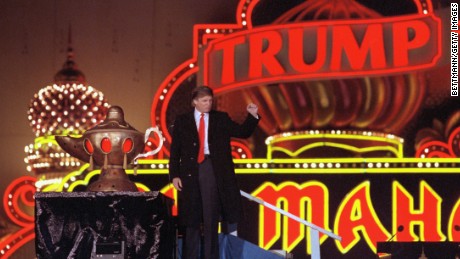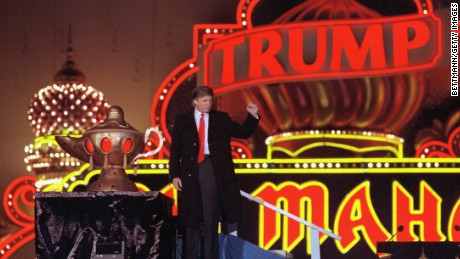Donald Trump’s Atlantic City finances tell story of business losses

(CNN)As the Republican presidential nominee faces mounting scrutiny over his income taxes and his refusal to release them, the public has no definitive accounting about what Donald Trump did or did not pay the government.
But the story of his business losses is in plain sight throughout the 1980s and the 1990s, a period, in which, he amassed nearly $1 billion dollars of personal debt.
Once gambling was legalized in the late 1970’s, a sleepy New Jersey shore town transformed into a gaming hot spot. That’s when Trump bet big on Atlantic City by amassing property along the boardwalk.
“When casino gaming came into Atlantic City, it was a monopoly,” says Marvin Roffman, a former gaming analyst for a prominent financial services firm. “They had basically the whole eastern market to themselves and everyone was looking for land to build a casino.”
Trump, basking in the success of building the Trump Tower in New York City, liked those odds. In 1984, he opened Trump Plaza Hotel and Casino and the following year he opened Trump’s Castle. It was all part of Trump’s spending spree in the late 1980s that included the iconic Plaza Hotel in New York, the famed Palm Beach Estate Mar-A-Lago, the Eastern Air shuttle which he renamed the Trump Shuttle, the 282-foot Trump Princess yacht and the largest tract of undeveloped land on the west side of Manhattan.
Still, there was one more thing Trump wanted: One of the biggest casinos in the world.
After months of complex negotiations, he bought The Taj Mahal in Atlantic City. Once the deal was made, a triumphant Trump called then-analyst Marvin Roffman.
“My telephone rang and he said, ‘Marvin, didn’t I do a terrific deal?’ and I said, ‘I think you did a great deal, but I think you made a mistake.’ He said, ‘What do you mean?’ and I said, ‘Why own three casinos in Atlantic City? How are you going to differentiate the marketing?’ and here was his comment, ‘Marvin, you have no vision. This is going to be a monster property.'”
Trump was right. It was a monster property that needed monster financing. Trump assured New Jersey gaming regulators that it wouldn’t be an issue.
Roffman remembers Trump telling the New Jersey Casino Control Commission, “The bankers were waiting in line to lend him the money. And that, under no circumstances would he resort to junk bond financing.” But the banks weren’t standing in line to lend Trump money. So, he resorted to the very junk bonds he had said he didn’t need. Roffman knew it was an enormous risk.
“To be able to make this project successful, to break even, you’d have to generate a casino win of somewhere over a million dollars a day. And no casino in the world had — at that time, had ever even come close to anything like that.”
The Taj Mahal casino became the biggest bet of Trump’s career, but soon his luck would run out. The hotel had huge operating problems. Simply put, Trump had over-extended himself.
When the economy and the real estate market plummeted in 1990, real estate attorney Alan Pomerantz said Trump owed $4 billion to his debtors, including almost a billion for which he was personally responsible.
“I think he borrowed more than most other prudent real estate people,” Pomerantz told CNN. “Because he personally guaranteed so much debt, the leverage shifted dramatically over to the banks. Because it was no longer an issue of a bank and a piece of real estate. It was a bank and Trump’s actual survival.”
Trump owed money to 72 banks. Pomerantz, who represented them as a group, says Trump was very close to going personally bankrupt.
While Trump makes a point of saying he never went personally bankrupt, Pomerantz points out that there’s a reason why the banks decided to keep Trump whole.
“We made the decision that he would be worth more alive to us than dead. Dead meaning in bankruptcy. We don’t want him to be in bankruptcy. We want him out in the world selling these assets for us. … We kept him alive to help us.”
So the irony of Trump’s personal brush with bankruptcy is this: The banks decided that Trump should not be allowed to go bust because he was the best salesman to sell off his own properties and hammered out a five-year plan to allow him to repay his personal debts.
As Trump negotiated with bankers in 1990, two of his Atlantic City casinos were on the brink of failure.
Steve Perskie became chairman of the New Jersey Casino Control Commission in October 1990. He remembers when Trump’s father, Fred Trump, tried to rescue his son by buying more than $3 million in chips at Trump’s Castle. “Fred Trump’s lawyer was handed that value in chips and took the chips out of the casino. You could call it a three-million-dollar loan.”
But the loan wasn’t nearly enough. In July 1991, under crushing debt, the Taj Mahal filed for Chapter 11 bankruptcy which stiffed investors and forced small business to accept pennies on the dollar for their work. By March 1992, Trump’s Castle and Trump Plaza followed suit.
Read more: http://www.cnn.com/2016/10/05/politics/donald-trump-atlantic-city-finances/index.html

